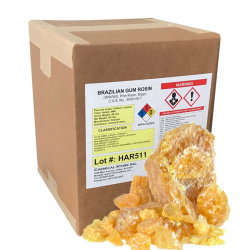Polymers
A polymer is a substance or material made up of macromolecules, which are very big molecules made up of several repeating subunits. Both synthetic and natural polymers play significant and pervasive roles in daily life as a result of their wide range of features.

GP10001
Antioxidant blend for polymers, non-blooming, FDA-listed, non-staining.
options
From $25 /lb

GUMARAB
Natural stabilizer and thickener used in food, printing, paint production, and more.
options
From $16 /lb

BROSIN
Light yellow-amber rosin flakes from Pinus Elliottii for versatile uses.
options
From $3.45 /lb

MCC101NF
Purified cellulose excipient for direct compression and granulation.
options
From $5.36 /lb

MCC102NF
Purified cellulose excipient for pharmaceutical binding and filling.
options
From $5.36 /lb

PEPDR105
Low molecular weight polyethylene powder for pigment dispersion, mold release.
options
From $8.50 /lb

PVOH3099
Medium-viscosity, fully hydrolyzed polyvinyl alcohol with excellent film properties.
options
From $11.23 /lb

PVOH4988
High-viscosity, partially hydrolyzed polyvinyl alcohol for diverse applications.
options
From $14.77 /lb

PVOH688
Low-viscosity polyvinyl alcohol for textile stiffening and paper sizing.
options
From $11.36 /lb

PVOH6299
High-viscosity, fully hydrolyzed polyvinyl alcohol with excellent tensile strength.
options
From $15.45 /lb
AGERITE® SUPERLITE® SOLID PWD
Antioxidant blend for polymers, non-blooming, FDA-listed, non-staining.
Calcium Carbonate, Fine Ground Limestone, Fcc
Calcium Carbonate, Fine Ground Limestone
Cation And Anion Exchange Resin
Uniform ion exchange resin for deionization and softening.
Cation Exchange Resin - Strongly Acidic
Water softener resin - strongly acidic.
Cation Exchange Resin 900 Grams
Acidic resin for cation exchange, 900 grams.
Crushed Pine Rosin (For Baseball Rosin Bag and Aquatint Dusting)
Fine crushed pine rosin for baseball and aquatint applications.
Dammar Gum Resin Crystals
White-yellowish, varied grades, natural resin.
Dibutyl Phthalate (DBP)
Plasticizer for plastics, elastomers, coatings, and industrial uses.
Ester Gum (Glycerol Ester of Gum Rosin)
Transparent yellow resin for adhesives, paints, and emulsifiers.
Fumaric Resin
High-performance polymer for coatings and composites.
Gum Arabic, Natural
Natural stabilizer and thickener used in food, printing, paint production, and more.
Gum Rosin Flakes, Brazilian, WW Grade
Light yellow-amber rosin flakes from Pinus Elliottii for versatile uses.
Gum Rosin Lumps, Honduran, Grade Wg/Ww
High-grade pine rosin with excellent anticrystalline properties.
Hydroxyethyl Cellulose, HEC 250, Natrosol™ 250
thickener for water based products
Liquid Starch 1 Oz
Craft and science experiment starch concentrate.
Magnesium Carbonate, Basic, USP, "Extra Light"
Extra light magnesium carbonate, USP/FCC grade, food/pharmaceutical use.
Microcrystalline Cellulose 101 Nf (Super Fine)
Purified cellulose excipient for direct compression and granulation.
Microcrystalline Cellulose 102 Nf (Fine)
Purified cellulose excipient for pharmaceutical binding and filling.
Partially Hydrogenated Gum Rosin
Adhesive enhancer with improved stability and lighter color.
Polyethylene Powder
Low molecular weight polyethylene powder for pigment dispersion, mold release.
Polyoxyethylene Nonylphenol (Np-9)
Effective nonionic surfactant, widely used, combustible, nontoxic.
Polyvinyl Alcohol PVOH3099
Medium-viscosity, fully hydrolyzed polyvinyl alcohol with excellent film properties.
Polyvinylalcohol Grade 22-88, Pva 217, Elvanol 52-22
Water-soluble polymer with excellent film and binding properties.
Polyvinylalcohol Grade 25-88
Medium-viscosity, partially hydrolyzed polyvinyl alcohol for coatings and films.
Polyvinylalcohol Grade 49-88
High-viscosity, partially hydrolyzed polyvinyl alcohol for diverse applications.
Portuguese Rosin, Flakes,
Rare Brazilian rosin flakes packaged in Portugal.
Rosin Powder Blend With Calcium Carbonate
Fine powder with 80% rosin, 20% calcium carbonate.
Rosin Powder Silica Blend
Custom blend of fumed silica and micronized rosin powder
Rosin Powder, 100% Natural Rosin
100% pure powdered Brazilian gum rosin for grip enhancement.
SELVOL 205 Polyvinyl Alcohol, PVOH688
Low-viscosity polyvinyl alcohol for textile stiffening and paper sizing.
Selvol165 Polyvinyl Alcohol Grade 6299
High-viscosity, fully hydrolyzed polyvinyl alcohol with excellent tensile strength.
Sodium Lauryl Sulfate 30%
Highly effective emulsifying cleaning agent for removing oily stains and residues.
Water Soluble Starch, Laundry Starch Powder
Water-soluble laundry and craft starch powder.
- 1


























